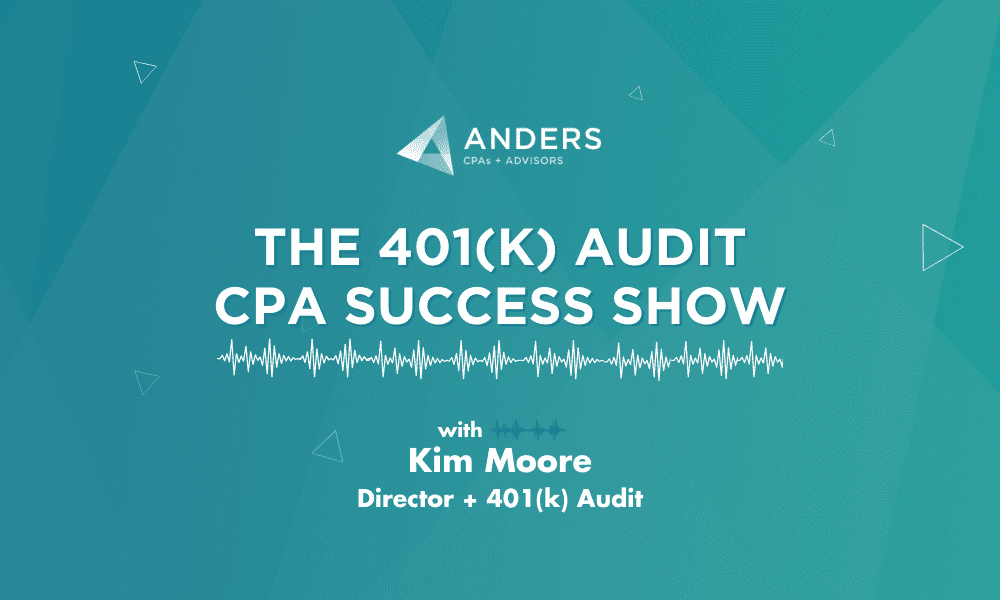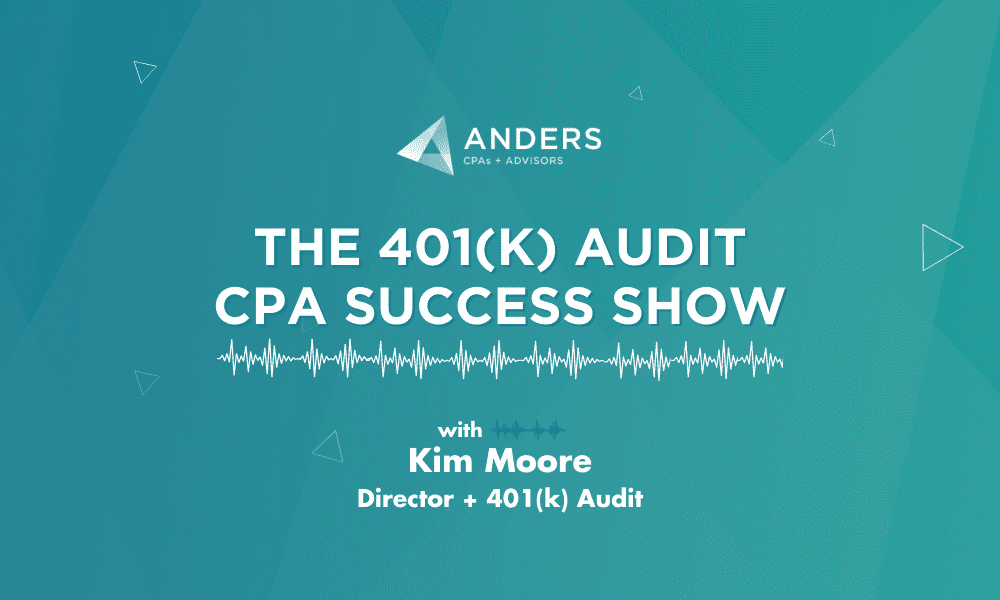As year-end and final deadlines approach, 401(k) plan sponsors and administrators should remember to double-check the fine details of their plan document to ensure they’ve followed guidelines set by the Department of Labor (DOL), ERISA and the IRS. Failure to follow these guidelines, such as acquiring a fidelity bond, passing all discrimination testing and adhering to your contribution schedule to ensure you avoid late deposits, could result in hefty fines, legal liability and even jail time for extreme cases.
In this episode of the 401(k) Audit CPA Success Show podcast, Director and 401(k) Audit Practice Leader Kim Moore and Audit and Assurance Manager Karen Hill share best practices for plan administrators and sponsors to keep up with ERISA, DOL and IRS compliance matters.
Key Takeaways:
- Fidelity bonds are required per ERISA and must cover 10% of the plan assets up to $500,000
- Failing discrimination testing year after year should be an indication that you need to consult with your third-party administrator and determine if your plan should change as a result
- Monitor distributions from the plan to ensure the funds are going to the appropriate participant and the distribution was valid and actually requested by one of your employees or their beneficiaries
- Plan sponsors or administrators can be sentenced to prison for mismanagement of participant contributions
- You should ensure that all contributions get funded to the plan; if you find that you missed a contribution you can use the DOL correction programs to make corrections for that error
Secure a Fidelity Bond for Your 401(k) Plan
Although some third-party 401(k) administrators may claim you don’t need a fidelity bond for your plan, it’s an ERISA requirement. When the DOL reviews your Form 5500, the agency will want to see proof that your plan is covered by a fidelity bond. This is currently a hot-button issue for the DOL. We recommend you review your coverage in this area and make sure your plan is covered by a fidelity bond that covers 10% of the plan assets up to $500,000 or $1,000,000 if the plan holds employer securities. The bond will need to be provided by an approved company, the Treasury Department website contains a surety listing of approved companies to choose from.
Difficulties with Discrimination Testing
Discrimination testing involves several tests that are required to ensure the plan is not unduly benefiting highly compensated employees. These tests need to be completed early in the year, usually after preparation of the plan census. Take the time to make sure you understand what the census requires because if you use incorrect information, it could cause you to fail a test you should have passed or pass a test you should have failed. Either way, this can create unnecessary difficulties and force you to make time-consuming corrections.
Failing discrimination testing could force you to pay out refunds to bring your plan back into compliance, which can have a substantial tax impact on those highly compensated employees, who are typically executives in the company. Refunds could force these employees to refile their taxes, which can be a costly and time-consuming burden. If your company has failed discrimination testing over multiple years, consult with your third-party administrator to see if there’s a way to change the plan and prevent future difficulties.
Verify Distributions and Withhold Contributions Correctly
Distributions should be regularly reviewed to ensure the only people accessing funds are participants in the plan. 401(k) accounts are occasionally targeted by hackers and other cybercriminals who take unauthorized distributions. Sometimes, someone close to the participant, a spouse, relative or other relationship, may make an unauthorized distribution when the relationship falls apart or after an argument. Reviewing distributions and verifying them with participants can help identify misused funds quickly. Often an employee who’s been terminated may make a distribution to remove all their plan account, so take care to look over each distribution to make sure there’s nothing unusual going on.
Withholding funds from employees to fund 401(k) accounts can become complicated and potentially have legal or criminal implications for plan sponsors and administrators. As the plan fiduciaries, these individuals are liable for whatever happens within a plan, especially if they are found to be misusing participant funds for their own personal use. A common error that could result in someone being sent to prison occurs when money that was supposed to be withheld from the payroll isn’t ever deposited in the correct participant account. It may be that the funds were held onto for too long and its original purpose was forgotten. Unfortunately, sometimes those funds are inappropriately and purposefully used for personal means. As these funds always belonged to the participant, these cases of theft are taken very seriously.
Late Contributions Rely on Timeliness and Consistency
It’s important for plan administrators or sponsors to remain consistent and timely when remitting 401(k) contributions. The guidelines require contributions to be remitted to the plan as soon as administratively feasible, which is a vague direction. You should remit the funds as quickly as possible, preferably on the same day as payroll or soon after. Stay consistent as well, avoid taking two days here and 45 days there. The DOL will look at your records and look to the smallest amount of time and consider everything else to be late. Don’t be afraid to reach out to the DOL to let them know if you’re making a late deposit correction, they’re more understanding if they’re aware that you’re fixing a mistake than they are if you pretend there’s no issue at all. The DOL has a correction program specifically designed for late contributions.
If you need an audit for your 401(k) plan, learn more about our 6-phase 401(k) audit process or request a free 401(k) audit consultation below.
Watch the 401(k) Audit CPA Success Show: Keeping up with 401(k) Compliance Requirements on YouTube and subscribe on Spotify or Apple Podcasts and let us know what you think by rating and reviewing.


